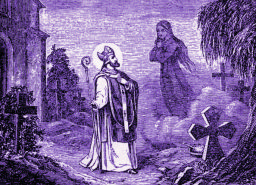WHEN THE INFANT OF PRAGUE DANCED FOR LITTLE NELLIE
 |
| Nellie's cot that she never outgrew |
As we saw in my post about Little Nellie's conversion, Nellie had a great love of music which was once greater in her than her love for the Eucharist. She also had precocious musical talent, and among her few possessions was a tin bugle which she had taught herself to play and which she used to compose little tunes. Had she lived beyond 4 years of age, she would have likely become a musician.
After Nellie had come to love the Infant of Prague, she was want to hug Him, call Him her baby, and cover Him with kisses, and she also saluted Him with the tunes she played on her bugle. She had turned from merely loving music, to using music to love Him. One day she set the Infant up on a chair near her for a most important conversation with Him. Nellie's beloved nurse, Miss Hall was sick, and she asked the Divine Infant that He make her "Modder" Miss Hall better.
Then she took out her tin bugle and struck up a tune to Him, before she stopped and on childish whim she asked Him to dance for her. Straightaway, a joy came over Nellie's face, her eyes shone brilliantly and her cheeks were radiant pink. She kept piping her little melody, and suddenly she stopped and exclaimed, "Him dance!" Nellie gasped for air, the puffing and blowing on her bugle had worn out her lungs which were infested with disease. She begged another girl in the infirmary, Katie to continue playing the instrument, but the minute Katie grasped the bugle and played it, Nellie's face fell downcast and she said dejectedly, "Ah, Him stopped now." It would appear that the Infant was happy to move to a tune played by Nellie, but not another child.
While all this seems outlandish and far-fetched, one of the nuns who knew Nellie extremely well was open to believing it, and she appealed to the Infant Jesus for a sign, when she asked Him, "Lord, if you did really dance for Little Nellie, please send us a bakehouse." The nuns desired a bakehouse to bake large batches of bread to feed themselves and the little ones, but such ovens were hideously expensive and the sisters were in debt. Only a few days after the nun made this request, a wealthy lady sent them 300 pounds with a note that read, "For the erection of a bakehouse". To our modern ears, 300 pounds sounds like a paltry figure, but t'was not the case in 1907, Ireland.
Austin Ruse, in his fine book, Littlest Suffering Souls, wrote about the occasion of the Infant dancing for Nellie and about the sign that was given the nun in the form of a huge sum of money, and Ruse states that this would be like thousands of dollars today. Yes, 300 pounds would be the equivalent of thousands upon thousands. To give an example, in 1907 a butler in a grand house was paid an average of 30 pounds a year. A butler's wages for ten years would have paid for a bakehouse. A cleaner was paid an average of 12 pounds a year, and would have had to work 25 years to earn the money for a bakehouse.
 |
| My worn copy of Gibbons' Little Nellie |
The nun who requested a sign from the Divine Infant that He had danced for Little Nellie gave a very detailed interview to Margaret Gibbons, that Gibbons used in her biography of Nellie. I believe Gibbon's biography is the best book on Nellie. But the occasion when the Infant of Prague danced for Nellie was not included in the biography by Father Scannell, it was suppressed because it was thought too hard to believe. Margaret Gibbons challenged this in her book and pointed out that the same people who stopped the account from making it into the pages of Scannell's work had no problem in believing similarly spectacular stories told about faraway saints. Gibbons was an Irishwoman who wrote her book a relatively short time after Nellie passed away, and it sounds like Gibbons knew the same Irish Catholics who held back Father Scannell's hand from including the vision of the Infant dancing for Nellie, and her beef with them was that they were happy to believe in foreign saints, but not in a little Irish girl.
T'would perhaps serve you and I well to be more like Margaret Gibbons and the sisters who cared for Nellie in that we may do well to believe it, too. Not that we might ask the Infant of Prague to dance for us any time soon, but we may ask Him to provide for our urgent needs. To think that the Infant was so generous to the sisters when He was asked for a sign of the high esteem in which He placed Nellie that He gave them a huge sum of money. The Infant may be equally generous if not more so if we ask through the intercession of Little Nellie for His help.
 |
| The Divine Child Who danced for Nellie |




Comments
Post a Comment